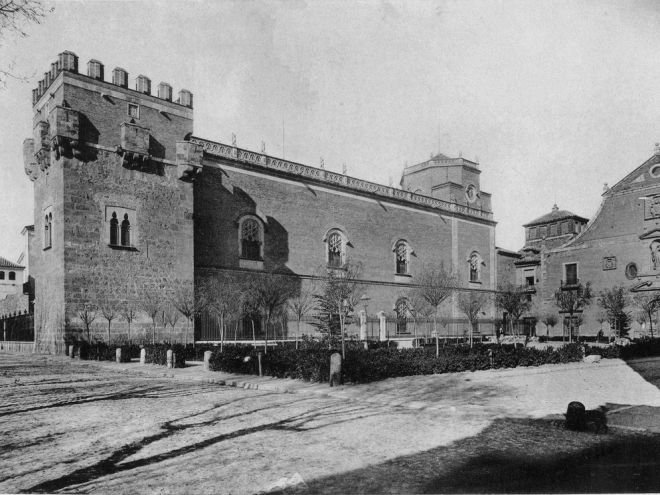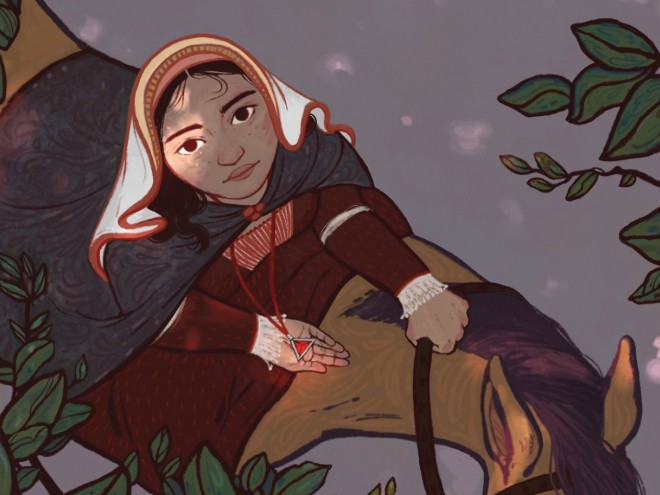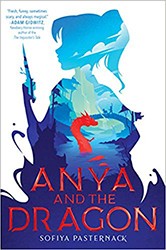Jewish life in Spain before the expulsion of 1492 is sometimes romanticized as a distant and glorious part of history ending in tragedy. Gail Carson Levine’s new novel, A Ceiling Made of Eggshells, restores the dramatic reality of the time through the story of one Jewish girl and her family. Carefully researched and rich in historical detail, the book creates a full portrait of the painful contradictions that defined the fifteenth-century Iberian Jewish world. Levine weaves a complex web of narrative threads and places her characters in situations of moral and emotional ambiguity.
Paloma “Loma” Corcia is kind and affectionate towards her younger siblings, nieces, and nephews. She’s eager to someday be a wife and mother. Her own parents are loving but imperfect, and her older brother embodies some of the most negative traits of an era when compromise and betrayal were common. Loma’s “Belo”(short for abuelo, or grandfather), Joseph, is a commanding figure; according to the author’s note, he is based “very loosely” on the famous Jewish scholar and community leader Isaac Abravanel. His attachment to his granddaughter is based on his recognition of her intelligence. Since she is female, however, this quality is problematic. Levine’s portrait of Joseph is honest and subtle. He insists that Loma accompany him on important diplomatic and financial missions, but also depends on her to care for him in a frankly selfish way. Their relationship is not filtered through modern norms — Levine describes Loma’s unquestioning loyalty to the family patriarch, but also her frustration and fear that he will willingly sacrifice her future happiness to his own needs.
The novel’s structure mirrors the maze of contingencies and dangers that confronted Spain’s Jews. They are blamed for the plague but also used by the monarchy and nobles as a reliable source of income and financial expertise. Synagogue services are interrupted by sermons by Christian clergy warning them that their souls are in danger. Conversion was a temptation; Loma even allows herself to imagine her life as a Christian: “ … believing that God had a son, eating pork, marrying a Christian, having Christian children, not needing Bela’s [her grandmother’s] amulet because no one kidnapped Christian children.” Few Jewish families were spared the reality of this alternative to oppression, and the Corcias are no exception. Loma’s grandfather had praised her stubbornness because “Stubbornness in a Jew is a virtue,” but that same quality could threaten Jews if they refused to bend to authority.
Multiculturalism was a defining feature of Spain before both Jews and Muslims were forcibly converted, deported, or killed. The Corcias’ Muslim servant, Hamdun, is empathetic and supportive, and his closeness with Loma is poignant evidence of their shared vulnerability. Levine avoids cultural stereotypes, although she does not minimize the degree to which antisemitism pervaded Spanish culture — from the unthinking cruelty of neighbors to the example set by King Ferdinand and Queen Isabella, who are determined both to exploit Jews and to punish their rejection of Christ. Young readers will learn a great deal about the origins of racial antisemitism in Spain — where even conversion did not bring about equality between “old” and “new” Christians, who were still separated by the concept of “blood purity.” Integrated into the book as an unexpected gift are verses that Levine based on actual works from Spain’s Jewish Golden Age of Hebrew poetry. It also includes an exceptionally informative introduction, author’s note, glossary, and recipe for Sephardic eggs. Loma’s engrossing story is not a history lesson, but important historical understanding emerges naturally from this accessible work of fiction.
Emily Schneider writes about literature, feminism, and culture for Tablet, The Forward, The Horn Book, and other publications, and writes about children’s books on her blog. She has a Ph.D. in Romance Languages and Literatures.





